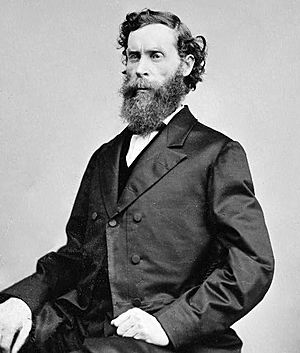John P. C. Shanks facts for kids
Quick facts for kids
John Peter Cleaver Shanks
|
|
|---|---|

John P. C. Shanks
|
|
| Born | June 17, 1826 Martinsburg, Virginia (now West Virginia) |
| Died | January 23, 1901 (aged 74) Portland, Indiana |
| Place of burial |
Green Park Cemetery, Portland, Indiana
|
| Allegiance | United States of America Union |
| Service/ |
Union Army |
| Rank | |
| Commands held | 7th Indiana Cavalry Regiment |
| Battles/wars | American Civil War |
John Peter Cleaver Shanks (born June 17, 1826 – died January 23, 1901) was an important person from Indiana. He served as a U.S. Representative (a lawmaker for the country) and was also an officer in the Union Army during the American Civil War.
Contents
Early Life and Law Career
John P. C. Shanks was born in Martinsburg, which was then part of Virginia but is now in West Virginia. He went to school and studied hard.
He decided to become a lawyer. In 1848, he passed his exams and was allowed to practice law. He started his law career in Portland, Indiana, in 1849. Shanks also worked as a prosecuting attorney for Jay County in 1850 and 1851. A prosecuting attorney is a lawyer who works for the government to bring legal cases against people accused of crimes. Later, in 1855, he served as a member of the State house of representatives, which means he was a lawmaker for the state of Indiana.
Serving in Congress
Shanks was a member of the Republican political party. He was elected to the U.S. Congress in 1861. This meant he helped make laws for the entire country. He served in Congress until 1863. He tried to be re-elected in 1862 but was not successful at that time.
Military Service in the Civil War
During the American Civil War, John P. C. Shanks joined the Union Army. He became a colonel, which is a high-ranking officer. From September 1861 to June 1862, he worked as an aide-de-camp (a personal assistant and helper) to Major General John C. Frémont.
He continued to serve in the army and was given command of the 7th Indiana Cavalry Regiment as a colonel from 1863 to 1864. On December 12, 1864, President of the United States Abraham Lincoln suggested that Shanks be given the honorary rank of brevet brigadier general of volunteers. A "brevet" rank is an honorary promotion given for brave or important service, but it doesn't always come with a pay raise or higher command. The United States Senate agreed to this promotion in February 1865.
After this, he led a cavalry brigade (a large group of soldiers) in the Department of Mississippi until September 19, 1865. At that point, he left the volunteer army.
In 1867, President Andrew Johnson also suggested that Shanks receive the honorary rank of brevet major general of volunteers. This was confirmed by the Senate in February 1868.
Return to Politics and Later Life
After his military service, Shanks was elected to the U.S. Congress again in 1867. He served for four terms, until 1875. During this time, he was the chairman (leader) of important committees. He led the Committee on Militia and the Committee on Indian Affairs. These committees helped make decisions about the military and about Native American relations.
He tried to be nominated for re-election in 1874 but was not chosen by his party. After leaving Congress, he went back to working as a lawyer. In 1879, he once again served as a member of the State house of representatives in Indiana.
John P. C. Shanks passed away in Portland, Indiana, on January 23, 1901. He was buried in Green Park Cemetery.
 | Madam C. J. Walker |
 | Janet Emerson Bashen |
 | Annie Turnbo Malone |
 | Maggie L. Walker |

